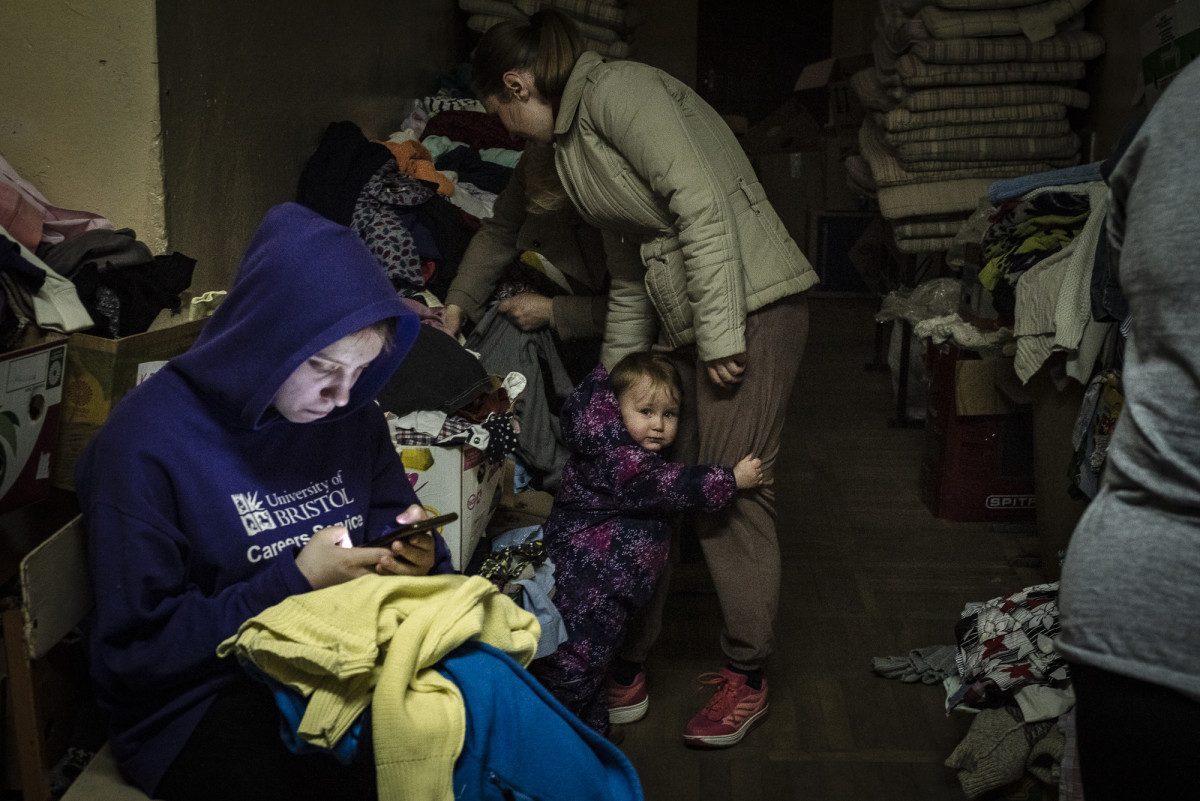IN PICTURES: Schools have been turned into makeshift shelters for displaced people in Ukraine
Published: Apr 26, 2022 Reading time: 5 minutes Share: Share an articleAs education in Ukraine has shifted online since February 24th, education institutions have been turned into makeshift shelters for refugees from elsewhere in the country. Classrooms have filled with mattresses and bedsteads, sports halls have become warehouses for food and hygiene items, and entrance halls resemble bazaars of donated clothing and toys.

The secondary school in Drohobych, Lviv oblast, is now a temporary home for 150 people. Some stay a night or two before moving on to greater safety outside Ukraine; some look for more permanent and comfortable housing, and some are in limbo, unable to leave or to return.
“Lots of men stay because the women have gone abroad and the men have nowhere to go back to,” explains Oksana Machyshin, the director of social services in Drohobych. By Ukrainian law, men aged between 18-60 cannot leave the country and have to register to be potentially called up to the army.
In the meantime, there is no work in a small town like Drohobych for the sudden influx of people (around 6000 IDPs are currently in the town and surrounding villages). Most try to find volunteer work, says Machyshyn, to keep themselves occupied.
Maksim Mohamed was helping unload a delivery of bedding and mattresses on a recent afternoon. “Of course I help whenever I can,” he said. “I’ve got a conscience, and we’re here at someone else’s expense.”
Mohamed, from Kharkiv, has escaped war for the second time. He is half Yemeni, half Ukrainian and fled with his mother from the conflict in Yemen when he was 11.
“I remember the sirens, and mum screaming that we had to leave, and hearing explosions. We left a lot behind,” he said. “We left in a hurry; it was really noisy and I was little and scared.”
Now 31, he was living and working in Kharkiv when war started again. After twelve days of shelling, when medications and food in the city were already running low and a bomb hit a nearby factory, shaking the windows of his building, he grabbed a bag, went the railway station and got on the first train out. He ended up in Drohobych thanks to someone else he met on the train who told him he could find a place to stay here.
The club in Kharkiv where Maksim worked as a systems administrator no longer exists, and neither, most likely, does the flat he owns in the town of Kupets, which has been occupied by Russia since the first weeks of the war. “I very much doubt I’ll ever go back to it,” he said. “I’ve already mentally said goodbye to it.”
Now he shares a Ukrainian history classroom with several other refugees, including Nikita Badanov, also from Kharkiv. Maksim has relatives in France who have invited him to come and live with them, but with a Ukrainian passport (his Yemeni passport is with his father still in Yemen) he has been unable to leave the country.
“So I’m just waiting, trying not to panic, and hoping for the best,” he said.
Nikita, a 23 year old student, is waiting too. He arrived in Drohobych hoping to stay with some distant relatives with whom he had not been in touch for years, only to find they had gone abroad, so he sought shelter in the school. His mother and grandparents are still in Kharkiv, but tell him it’s not safe to go back – the city is still being shelled daily.
“We all want stability, and not to live like this,” he says, “but there aren’t so many options – either I’m here or I’m in Kharkiv. So I’m staying here.”
In the mathematics classroom is a family of three – Svitlana Synitsa and her daughter Viktoria, 6, and Veronika, 2. They left besieged Chernihiv after three weeks without water, electricity or heating, sheltering at night in a basement. They managed to escape the town on their second attempt, driving across fields with volunteers who had brought medications to the city.
Svitlana’s husband is still in Chernihiv and Svitlana, who is still dazed from her experience, says she can’t really think about what to do next, although she’s been offered the option of going to Italy or Spain.
The school is not the most convenient accommodation, with little privacy and a queue for for the bathrooms, “But after three weeks in a cellar, for us it’s pure pleasure,” she said.
Some refugees are already moving back to towns like Kyiv, from which Russian forces have retreated for now, but more and more are fleeing east Ukraine, and towns like Drohobych are thinking how to cope with the influx of people who have nowhere to go back to.
“It’s already been a month, and now we need to think about the future; we need to think about where people will live,” said Machyshyn. “The schools are full. At first most people only stayed for two or three days, but the ones coming now are staying, so we need accommodation for them.” The city council has already allocated land, she said, and are considering how to fund modular housing.
People in Need continues to support collective centers delivering matrasses, linen, blankets and equipment to the centers in order to help those who seek for safety in Drohobych.
